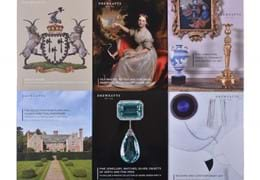Rufus Bird | The Historic Houses Collections Award 2023
Dreweatts is delighted to once again to have sponsored the annual Historic Houses Collections Award. The award was introduced last year to honour the creators, owners, curators, researchers, and conservators who preserve, augment, restore and interpret the beautiful and significant objects on show inside historic houses up and down the country, enabling the public to understand and enjoy them and the stories they tell.
The winner of this year's award is Ushaw, Durham.
On the look-out not for the ‘best’ collection but rather for the most compelling story of custodianship, we drew upon five leading experts in the world of curating, collection and creation to judge the award, including Rufus Bird. Having previously worked at Christies in the furniture department, and as Surveyor of the Queen’s Works of Art at the Royal Collection, Rufus Bird is now an art advisor at Gurr Johns where he is Director of Decorative Arts and Heritage Collections, Europe. He assists clients of all types and budgets in the formation and/or sale of their collections. Here, Rufus tells us more about the importance of historic collections and judging this year's award.

The Historic Houses Collections Award Judges 2023
This year, myself and four others were privileged to be selected as panel members for the second annual Historic Houses Collections Award. The panel included Giles Kime, Executive and Interiors editor at Country Life; Hamish Dewar, picture restorer; Alice Dugdale, private collection curator and Alice Minter, Senior Curator of the Rosalinde and Arthur Gilbert Collection at the Victoria & Albert Museum.

The Shortlist of Five Historic Houses
After we had reduced the long list of applicants to five candidate houses, our visits took place during the months of June and July. It was especially valuable to visit houses with fellow judges and to take time to discuss the merits of each, both at the houses we visited and together as a panel at a later date. The judging criteria presented to the panel are wide-ranging, which pleasingly allows for a broad appreciation of what today's custodians of collections in Historic Houses are developing and achieving.
Unquestionably the dominant characteristic which caught the panel’s attention this year was innovation in interpreting collections. We visited fascinating collections up and down the country, from Powderham in Devon to Cragend Farm in Northumberland, but it was the creativity in how these collections were presented, not just their inherent meaning or importance which dominated our discussions and ultimately our final decision.

Collections are handed down to us and live within a house or family and provide a valuable human link into the past with the present-day visitor. Usually those collections have remained in situ for generations and are intimately bound up with the history of a family or with a particular building. What excited us on our journeys was hearing about the different ways in which the teams responsible for presenting and interpreting the collections chose to explain complex objects from their collections and their histories.
As part of their coronation display this year, the team at Goodwood exhibited a rediscovered costume from an early 20th century coronation and a moving back-story, showing objects in a traditional setting along the visitor route. Powderham Castle sought to bring in local volunteers from minority groups and has partnered with universities to research and present new information about the collection, especially in respect of its archives: Powderham won the Archives Special Mention award. Last year Temple Newsam House near Leeds, brilliantly acquired a spectacular piece of furniture commissioned around 1770 by Charles Townley, and this year the team there developed a series of didactic information boards in each room. These were carefully written to appeal to visitors with different interests and abilities from the specialist to the child: the Curator Special Mention award went to Temple Newsam. Finally, we were all bowled over by Cragend Farm and the extraordinary collection of innovative farm machinery, developed by the Armstrong family in the late 19th century. This place embodies much about the heroic efforts historic house owners are faced with today, to revive, discover, restore and care for collections - whether they are Tudor vestments or farm machinery. We were delighted to award the Custodian award to Cragend Farm.

Ushaw - The Historic Houses Collections Award Winner 2023
Ultimately, however, the panel decided that Ushaw’s innovative approach to presenting their collection through the use of a special downloadable app, developed in direct response to the national lockdowns in 2020, was the most compelling. The aim was to welcome Ushaw’s local community around Durham, something they had struggled to achieve since opening as a visitor attraction in 2015: the previous life of the building as a school and Catholic seminary meant keeping intruders out.
By developing the app visitors were encouraged to visit the gardens during the lockdowns and were also able to interact with the collections in a virtual way. As a result, Ushaw’s visitor numbers increased during lockdown and the app continues to impress visitors. This parallel, digital approach to presenting history and art has been successful in other creative media - and at scale: cinemas showing theatre and opera have demonstrably brought audiences into theatres. And so it proved on a small scale at Ushaw. The app was beautifully designed, simple to use and provided a direct appreciation of works of art and the history of Ushaw. After reopening was permitted, visitors came back to see the chapel and the historic house having experienced the gardens and the app.
Collections provide us today with a chance to find historical narratives: Ushaw’s creativity in responding to the circumstances of a national lockdown which removed that chance in the end proved inspirational for visitors while also generating an exciting, creative and virtual experience with the collections which miraculously come alive.
The Collections Award | Historic Houses x Dreweatts
All the collections in Historic Houses member places are unique, priceless, and inseparable from the individuals and families who have brought and kept them together. Each year our judges will choose a collection that best exemplifies the way that those who care for our independent heritage:
- Recognise and research the significance and stories of their artefacts;
- Respond to new imperatives and challenges, both social and technical;
- Reimagine the composition or presentation of the collection for a new generation.
We look forward to working with Historic Houses in 2024, exploring and recognising more collections!
Film shown by permission of Historic Houses
















